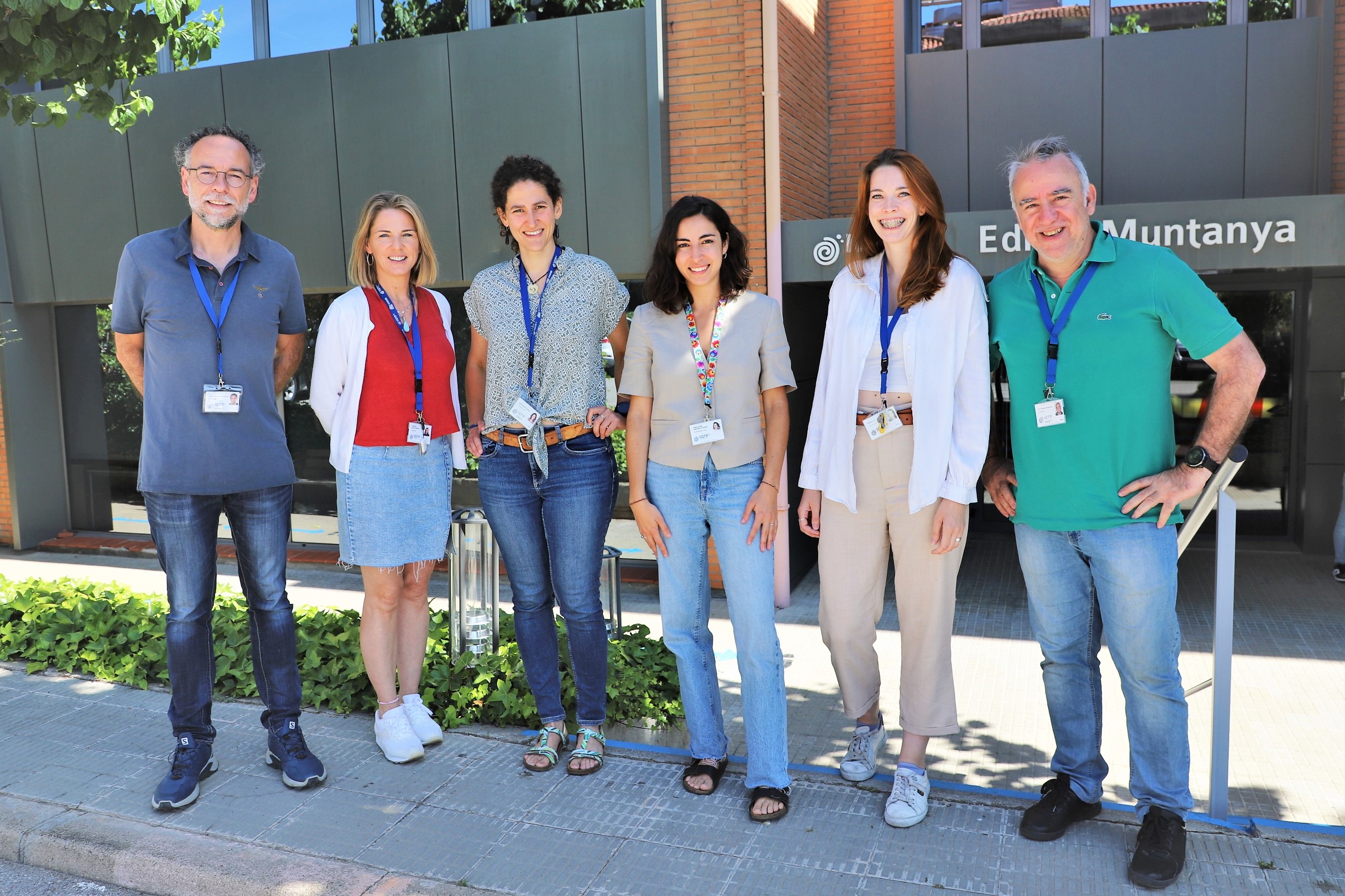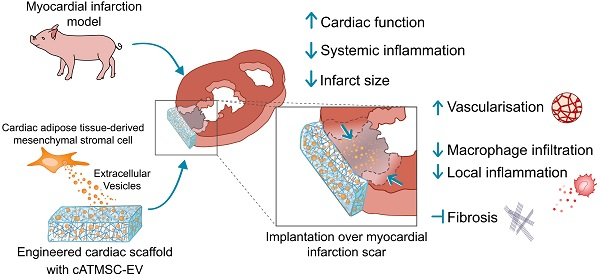Bioimplants with extra-cellular vesicles from stem cells can improve cardiac function after an acute myocardial heart attack

Researchers from the ICREC Group (Cardiac Insufficiency and Regeneration) in cardiovascular diseases at the Germans Trias i Pujol Research Institute (IGTP) continue to work on therapeutic technologies to repair cardiac tissue after a heart attack. In an article published in Theranostics, they present a study of extracellular vesicles from mesenchymal stem cells combined with tissue engineering as a therapy to repair the heart after a heart attack. They have carried out the study on a porcine heart attack model at the Centre for Comparative Medicine and Bioimage (CMCiB) at the IGTP.
 Patients suffering a myocardial heart attack are currently treated to reopen the obstructed coronary artery and restore blood flow to the damaged myocardium rapidly, thanks to the heart attack code. Even so, a scar can appear in the cardiac muscle of these patients and if it is large it can interfere with the correct beating of the heart and cause heart failure. To avoid this, researchers in the ICREC Group, led by Antoni Bayés Genís, have developed advanced therapies based on stem cell tissue engineering to promote repair after a heart attack.
Patients suffering a myocardial heart attack are currently treated to reopen the obstructed coronary artery and restore blood flow to the damaged myocardium rapidly, thanks to the heart attack code. Even so, a scar can appear in the cardiac muscle of these patients and if it is large it can interfere with the correct beating of the heart and cause heart failure. To avoid this, researchers in the ICREC Group, led by Antoni Bayés Genís, have developed advanced therapies based on stem cell tissue engineering to promote repair after a heart attack.
In their latest study recently published in Theranostics, they have demonstrated that an implant carrying extracellular vesicles from mesenchymal stem cells can improve cardiac function in a porcine model of myocardial infarction (heart attack). "We have seen that the extra-cellular vesicles reduce the inflammation resulting from the heart attack, favour the appearance of new blood vessels and reduce the adverse remodelling, which the heart undergoes to adapt to the loss of muscle capacity," says the lead author of the paper, Marta Monguió-Tortajada. "The vesicles have many of the properties of the stem cells and certain advantages, such as avoiding transplant rejection and they are more stable, as they are not living cells." The work was a collaboration with the REMAR-IVECAT Group, led by Francesc Borràs, expert in isolating and characterizing extra-cellular vesicles.
As described in a previous publication, the localized administration of cardiac bioimplants allows a higher dosage in the target area of infarcted myocardium, which obtains much better localized effects and avoids unpleasant side effects. The group is now evaluating whether the implantation of mesenchymal stem cells (PERISCOPE Study) is safe and if it is beneficial for patients who have previously suffered a myocardial infarction.
"The optimization of therapies such as this, aim to improve patients' lives and avoid them reaching advanced stages of heart failure for which the only possible treatment to restore the heart's function is a heart transplant," explains Caroline Gálvez-Montón, who led the study in pigs. "Apart from being very invasive surgery, the current number of donations and the rising number of patients with heart diseases makes transplant unsustainable."
This study has been financed by La Marató de TV3, the Spanish Government, via the Instituto de Salud Carlos III and the Ministry of Science and Innovation (MICINN and the Regional Development Fund of the European Commission) and the Catalan Institute of Health. Both ICREC and REMAR-IVECAT are Consolidated Groups with support from the Agency for Management of University and Research Grants (AGAUR) of the Government of Catalonia and ICREC is a member of the CIBER Network CIBER Cardiovascular and RICORS-Terav.
Reference
Monguió-Tortajada M, Prat-Vidal C, Martínez-Falguera D, Teis A, Soler-Botija C, Courageux Y, Munizaga-Larroudé M, Moron-Font M, Bayes-Genios A, Borràs FE, Roura S, Gálvez-Montón C. A cellular cardiac scaffolds enriched with MSC-derived extracellular vesicles límite ventricular remodelling and exert local and systemic immunomodulation in a myocardial infarction porcine model. Theranostics 2022; 12(10):4656-4670. DOI:10.7150/thno.72289. Available from https://www.thno.org/v12p4656.htm
